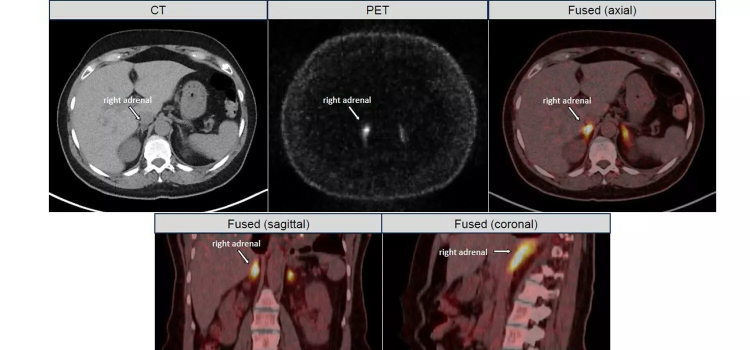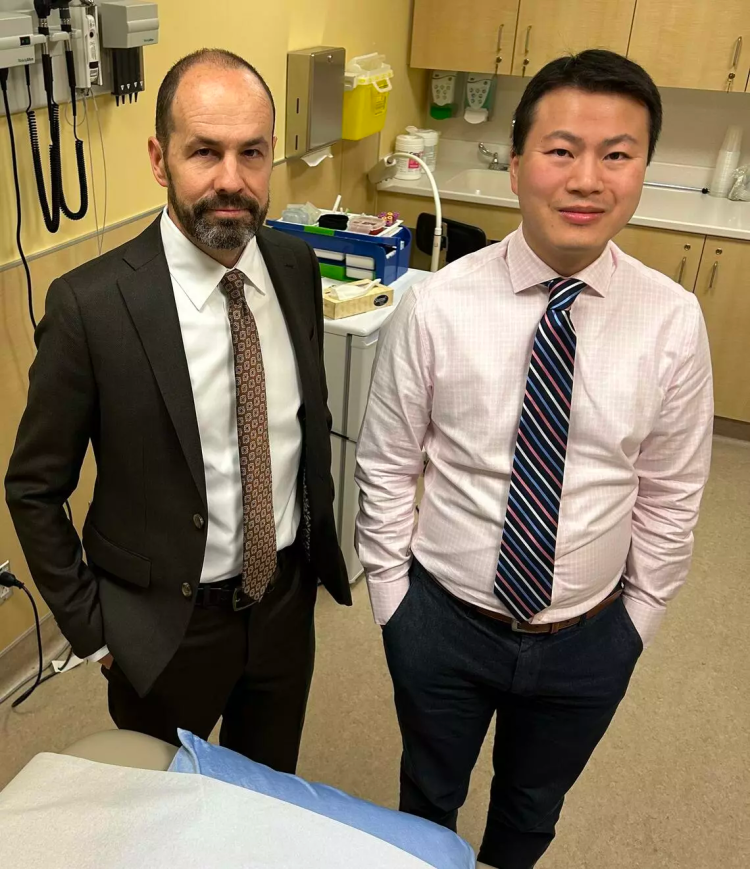A team of University of Calgary researchers is at the forefront of international advances in nuclear adrenal imagining, using an emerging technology to simplify diagnosis and improve the lives of people with adrenal disorders.
The research relates to adrenal glands, an essential part of our body's endocrine system that help control and coordinate our metabolism, energy level, reproduction, mood and response to stress.

Images of a UCalgary research participant's adrenal glands
Sitting on top of the kidneys, tumours can develop in these glands, which can lead to high blood pressure, kidney injury, heart rhythm problems and stroke. Treatment resistant hypertension is a condition that occurs when blood pressure remains high despite the use of multiple blood pressure medications.
Some patients can be cured through surgery, avoiding a lifetime of drug therapy. The key to accelerating and simplifying diagnosis is a non-invasive screening using nuclear adrenal imaging, known as CETO. It helps diagnose and locate the tumours with greater precision prior to surgery.
Drs. Gregory Kline, MD, along with Alex Leung, MD, are principal investigators leading efforts to bring CETO to Calgary. Kline participated last year in a sabbatical at Addenbrooke's Hospital in Cambridge, United Kingdom. From May to Oct. 2024, he furthered his expertise at one of the few hospitals in the world currently using the CETO technique.

Gregory Kline, MD, (left) and Alex Leung, MD, are principal investigators of new research advancing nuclear adrenal imaging in Calgary. Photo Credit: Kyle Marr
What is nuclear adrenal imaging?
"It's quite different from the traditional CT scan or MRI," says Kline. "The process involves injection of a very short-lived compound that finds and sticks to the tumour, giving off a tiny radioactive signal which provides an image of the adrenal glands and tumour within."
Nuclear adrenal imaging generates a more detailed image of the adrenal glands.
"This new imaging test is less invasive and has the potential to be faster and safer than what is currently available. It may eventually be accessible across the country, even for centres without a dedicated adrenal medicine program, making it possible for more patients to be diagnosed and treated," says Leung.
High blood pressure affects more than six million Canadians and is a leading cause of heart attacks and strokes. Around one in five people with high blood pressure have primary aldosteronism, a condition in which their adrenal glands make too much of a salt-retaining hormone.
Through the ongoing collaborative efforts with doctors at Addenbrooke's Hospital, Kline says they were able to scan and read the images of their first patient in Calgary using the new technique in late 2024. That first patient has already had the tumour diagnosed, located and surgically removed.
The researchers were awarded a Canadian Institutes of Health Research grant in January to continue their research with an expanded clinical trial.
The funded study is a phase II clinical trial that will take place over the next three years. Researchers will be evaluating whether the non-invasive CETO scan is more precise in identifying adrenal gland tumours compared to traditional tests. For this study, participants will receive the CETO scan and the current standard of care, a test called adrenal vein sampling. In addition to evaluating against the current standard, participants will be asked about their experience with the CETO scan.
UCMG sabbatical enables innovation
Kline's sabbatical was made possible through the University of Calgary Medical Group (UCMG). UCMG physician members provide patient care, education and lead research projects in various medical specialties. Members receive administrative support and can access sabbatical opportunities, fellowship training awards and other professional development opportunities.
More than 400 professional development sabbaticals have been awarded since UCMG started offering them in the 1990s.
Kline served as an honorary consultant at Addenbrooke's Hospital which included participating in clinical duties, teaching, research meetings, data assessments and multidisciplinary team meetings. His time there has led to an ongoing trans-Atlantic collaboration, with the Addenbrooke's Hospital team officially part of the CIHR grant.
Greg Kline is an endocrinologist and clinical professor in the Department of Medicine at the Cumming School of Medicine. He is medical director of the Calgary Osteoporosis and Metabolic Bone Clinic.
Alex Leung is an endocrinologist and associate professor in the departments of Medicine and Community Health Sciences in the CSM. He is a member of the Libin Cardiovascular Institute and the O'Brien Institute for Public Health at the CSM.











